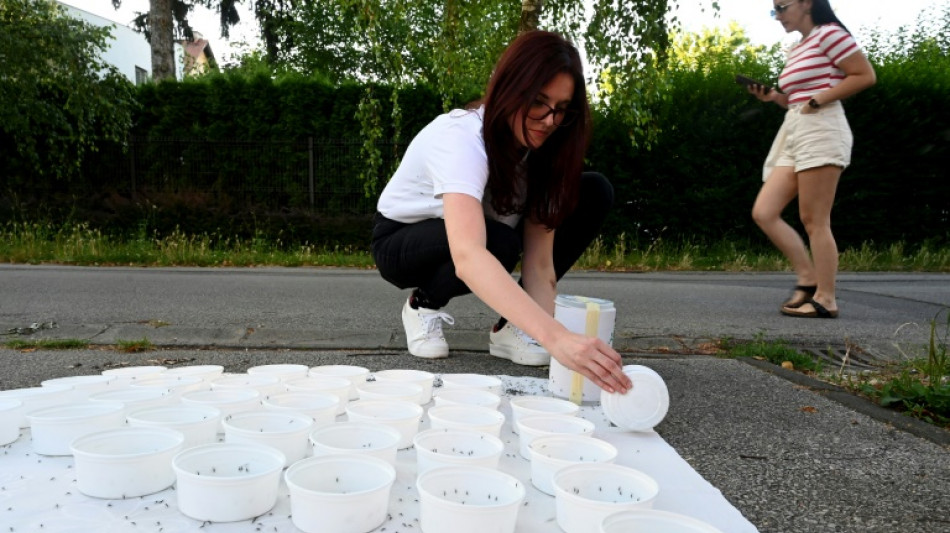
-
 'Schitt's Creek' star Catherine O'Hara died of blood clot in lung: death certificate
'Schitt's Creek' star Catherine O'Hara died of blood clot in lung: death certificate
-
'Best day of my life': Raimund soars to German Olympic ski jump gold

-
 US Justice Dept opens unredacted Epstein files to lawmakers
US Justice Dept opens unredacted Epstein files to lawmakers
-
Epstein taints European governments and royalty, US corporate elite

-
 Three missing employees of Canadian miner found dead in Mexico
Three missing employees of Canadian miner found dead in Mexico
-
Meta, Google face jury in landmark US addiction trial

-
 Winter Olympics organisers investigate reports of damaged medals
Winter Olympics organisers investigate reports of damaged medals
-
Venezuela opposition figure freed, then rearrested after calling for elections

-
 Japan's Murase clinches Olympic big air gold as Gasser is toppled
Japan's Murase clinches Olympic big air gold as Gasser is toppled
-
US athletes using Winter Olympics to express Trump criticism

-
 Japan's Murase clinches Olympic big air gold
Japan's Murase clinches Olympic big air gold
-
Pakistan to play India at T20 World Cup after boycott called off

-
 Emergency measures hobble Cuba as fuel supplies dwindle under US pressure
Emergency measures hobble Cuba as fuel supplies dwindle under US pressure
-
UK king voices 'concern' as police probe ex-prince Andrew over Epstein

-
 Spanish NGO says govt flouting own Franco memory law
Spanish NGO says govt flouting own Franco memory law
-
What next for Vonn after painful end to Olympic dream?

-
 Main trial begins in landmark US addiction case against Meta, YouTube
Main trial begins in landmark US addiction case against Meta, YouTube
-
South Africa open T20 World Cup campaign with Canada thrashing

-
 Epstein accomplice Maxwell seeks Trump clemency before testimony
Epstein accomplice Maxwell seeks Trump clemency before testimony
-
Discord adopts facial recognition in child safety crackdown

-
 Some striking NY nurses reach deal with employers
Some striking NY nurses reach deal with employers
-
Emergency measures kick in as Cuban fuel supplies dwindle under US pressure

-
 EU chief backs Made-in-Europe push for 'strategic' sectors
EU chief backs Made-in-Europe push for 'strategic' sectors
-
Machado ally 'kidnapped' after calling for Venezuela elections

-
 Epstein affair triggers crisis of trust in Norway
Epstein affair triggers crisis of trust in Norway
-
AI chatbots give bad health advice, research finds

-
 Iran steps up arrests while remaining positive on US talks
Iran steps up arrests while remaining positive on US talks
-
Frank issues rallying cry for 'desperate' Tottenham

-
 South Africa pile up 213-4 against Canada in T20 World Cup
South Africa pile up 213-4 against Canada in T20 World Cup
-
Brazil seeks to restore block of Rumble video app

-
 Gu's hopes of Olympic triple gold dashed, Vonn still in hospital
Gu's hopes of Olympic triple gold dashed, Vonn still in hospital
-
Pressure mounts on UK's Starmer as Scottish Labour leader urges him to quit

-
 Macron backs ripping up vines as French wine sales dive
Macron backs ripping up vines as French wine sales dive
-
Olympic freeski star Eileen Gu 'carrying weight of two countries'

-
 Bank of France governor Francois Villeroy de Galhau to step down in June
Bank of France governor Francois Villeroy de Galhau to step down in June
-
Tokyo stocks strike record high after Japanese premier wins vote

-
 'I need to improve', says Haaland after barren spell
'I need to improve', says Haaland after barren spell
-
Italian suspect questioned over Sarajevo 'weekend snipers' killings: reports

-
 Von Allmen at the double as Nef seals Olympic team combined gold
Von Allmen at the double as Nef seals Olympic team combined gold
-
Newlyweds, but rivals, as Olympic duo pursue skeleton dreams

-
 Carrick sees 'a lot more to do' to earn Man Utd job
Carrick sees 'a lot more to do' to earn Man Utd job
-
Olympic star Chloe Kim calls for 'compassion' after Trump attack on US teammate

-
 'All the pressure' on Pakistan as USA out to inflict another T20 shock
'All the pressure' on Pakistan as USA out to inflict another T20 shock
-
Starmer vows to remain as UK PM amid Epstein fallout

-
 Howe would 'step aside' if right for Newcastle
Howe would 'step aside' if right for Newcastle
-
Sakamoto wants 'no regrets' as gold beckons in Olympic finale

-
 What next for Vonn after painful end of Olympic dream?
What next for Vonn after painful end of Olympic dream?
-
Brain training reduces dementia risk by 25%, study finds

-
 Gremaud ends Gu's hopes of Olympic treble in freeski slopestyle
Gremaud ends Gu's hopes of Olympic treble in freeski slopestyle
-
Shiffrin and Johnson paired in Winter Olympics team combined


Croatia targets latest climate-change threat: mosquitoes
Hordes of buzzing but sterile mosquitoes are being let loose in Zagreb as Croatia gets ahead of worries that climate change could bring tropical diseases to the Mediterranean nation.
The release is part of a pilot project focused on eradicating invasive Asian Tiger mosquitoes known for carrying sicknesses like Dengue Fever, Chikungunya and Zika.
The species has appeared to thrive in the country and across the region in recent years due in part to climate change -- with the warmer weather providing fertile ground for the mosquito.
"It's too early to say whether this one will yield results," Zagreb resident Kruno Lokotar told AFP. "But I'm glad that we are not just sticking with spraying."
Croatia's effort centres on a method that uses sterilised male mosquitoes -- which once released into the wild will mate with females and neutralise the potential for future offspring.
The Zagreb project kickstarted in June, when 100,000 mosquitoes were released in a high-risk area with thick foliage where mosquitoes often congregate.
"If we release a sufficient number of sterile males during a certain period in an area, the mosquito population in that area will decrease," Ana Klobucar, a medical entomologist of the Zagreb-based teaching institute of public health who is overseeing the project, told AFP.
The plan is rooted in the Sterile Insect Technique (SIT) -- a method that has been used for decades across the world to combat various harmful insects, but is still being tested for its effectiveness against mosquitoes in urban areas.
Croatia started using it for mosquitoes last year in northern Istria peninsula.
This year a total of 1.2 million specially treated insects will be released there over a three-month period, entomologist Nediljko Landeka of the regional public health institute told AFP.
- Climate change impact -
The insects -- which have been rendered sterile after exposure to gamma rays -- are sourced from a laboratory in Italy, and shipped 500 kilometres (310 miles) to Croatia in special boxes.
Once received, Klobucar and her assistants carefully remove plastic bowls with the insects from cardboard tubes before they are later dispersed in local gardens in the target area.
Croatia's programme coincides with increasingly dire warning from experts that global warming could make swaths of Europe more vulnerable to infectious diseases spread by mosquito bites.
The presence of the Asian Tiger mosquito in Croatia was first recorded in 2004 after arriving in Europe in the late 1970s, with experts suggesting they made the journey in used tyres that arrived in Albania from China.
The breed has now spread to more than a dozen European countries, with the Mediterranean region having been hit the hardest, according to official figures.
As the mercury rises across the globe, the Asian Tiger mosquito is moving further north including in areas that were considered too cold for the species to thrive, including in Switzerland and Germany.
"We are afraid that together with the species, viruses could also easily adapt in the future to new environments," warned Greek entomologist Antonios Michaelakis.
Michaelakis -- who is also a researcher at the Benaki Phytopathological Institute in Athens -- has been instrumental in sharing his experiences from a programme in Greece with his Croatian counterparts.
In Greece in 2019, the project succeeded in slashing the population of Asian Tiger mosquitoes by 90 percent, he told AFP.
During a trial of the technique last year in Croatia's Istria, up to 14 percent of mosquito eggs in the area were found to be sterile and jumped to nearly 60 percent this year, Landeka added.
F.Schneider--AMWN


